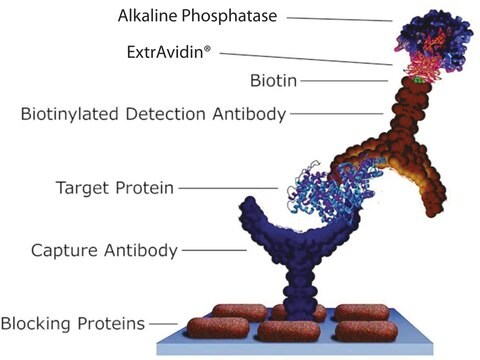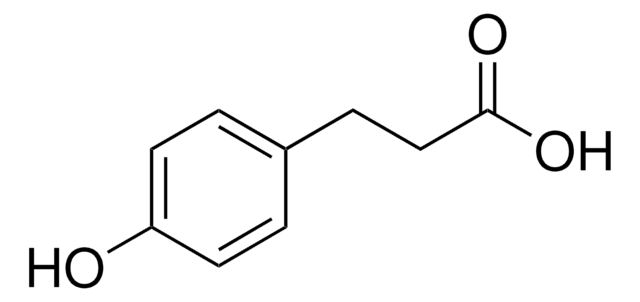A5403
Anti-Human IgG (γ-chain specific), F(ab′)2 fragment−Alkaline Phosphatase antibody produced in goat
affinity isolated antibody, buffered aqueous solution
Sign Into View Organizational & Contract Pricing
All Photos(1)
About This Item
Recommended Products
biological source
goat
conjugate
alkaline phosphatase conjugate
antibody form
affinity isolated antibody
antibody product type
secondary antibodies
clone
polyclonal
form
buffered aqueous solution
technique(s)
direct ELISA: 1:1,000
shipped in
wet ice
storage temp.
2-8°C
target post-translational modification
unmodified
Looking for similar products? Visit Product Comparison Guide
Related Categories
General description
Human IgG antibodies are primarily responsible for the facilitation of humoral immune responses such as placental transport, complement fixation and phagocytosis among many others. The antigen binding is mediated by the variable Fab region of IgG antibodies, whereas the effector activities are stimulated by the Fc domain , . Anti-human IgG (γ-chain specific), F(ab′)2 fragment-alkaline phosphatase antibody can be used in ELISA for measuring anticardiolipin antibodies. Goat anti-human IgG (γ-chain specific), F(ab′)2 fragment-alkaline phosphatase antibody reacts specifically with human IgG.
Immunogen
Purified human IgG.
Application
Serum IgGs against HHV-6 or HHV-7 were detected by Elisa using alkaline phosphatase conjugated goat anti-human IgG F′ab specific at a concentration of 1:1000 diluted in PBS/0.05% skim milk. The antibody was incubated on plates for 2 hours at 37 degrees.
Transfected SN56 neuronal cell lysates were ran on a SDS page gel for western blot analysis using alkaline phosphatase conjugated goat anti-human IgG Fab specific as the secondary antibody.
Physical form
Solution in 0.05 M Tris, pH 8.0, containing 1% bovine serum albumin, 1 mM MgCl2 and 15 mM sodium azide
Disclaimer
Unless otherwise stated in our catalog or other company documentation accompanying the product(s), our products are intended for research use only and are not to be used for any other purpose, which includes but is not limited to, unauthorized commercial uses, in vitro diagnostic uses, ex vivo or in vivo therapeutic uses or any type of consumption or application to humans or animals.
Not finding the right product?
Try our Product Selector Tool.
Storage Class Code
10 - Combustible liquids
WGK
WGK 2
Flash Point(F)
Not applicable
Flash Point(C)
Not applicable
Choose from one of the most recent versions:
Already Own This Product?
Find documentation for the products that you have recently purchased in the Document Library.
D Poretti et al.
The American journal of tropical medicine and hygiene, 60(2), 193-198 (1999-03-11)
We assessed an Echinococcus granulosus hydatid fluid antigen-ELISA (EgHF-ELISA) as a serologic prescreening test for E. granulosus infections, supplemented by more specific confirmatory tests, including arc-5 immunoprecipitation and antigen B subunit 8-kD immunoblotting. The diagnostic sensitivity of the EgHF-ELISA was
Joshua D Ooi et al.
Nature communications, 10(1), 3392-3392 (2019-07-31)
Autoreactivity to myeloperoxidase (MPO) causes anti-neutrophil cytoplasmic antibody (ANCA)-associated vasculitis (AAV), with rapidly progressive glomerulonephritis. Here, we show that a Staphylococcus aureus peptide, homologous to an immunodominant MPO T-cell epitope (MPO409-428), can induce anti-MPO autoimmunity. The peptide (6PGD391-410) is part
Robert M Anthony et al.
Journal of clinical immunology, 30 Suppl 1, S9-14 (2010-05-19)
IgG antibodies have long been recognized as proinflammatory mediators of the humoral immune response. Antibodies bind and neutralize antigens to promote antibody-dependent cytotoxicity, opsonization of antigens, and the initiation of phagocytosis. Whereas the antigen specificity of antibodies is determined by
Ana Cristina Magalhães et al.
The Journal of neuroscience : the official journal of the Society for Neuroscience, 25(21), 5207-5216 (2005-05-27)
Invasion of the nervous system and neuronal spread of infection are critical, but poorly understood, steps in the pathogenesis of transmissible spongiform encephalopathies or prion diseases. To characterize pathways for the uptake and intraneuronal trafficking of infectious, protease-resistant prion protein
ACP Broadsheet no 136: February 1993. Detection and importance of anticardiolipin antibodies.
M A Khamashta et al.
Journal of clinical pathology, 46(2), 104-107 (1993-02-01)
Our team of scientists has experience in all areas of research including Life Science, Material Science, Chemical Synthesis, Chromatography, Analytical and many others.
Contact Technical Service



